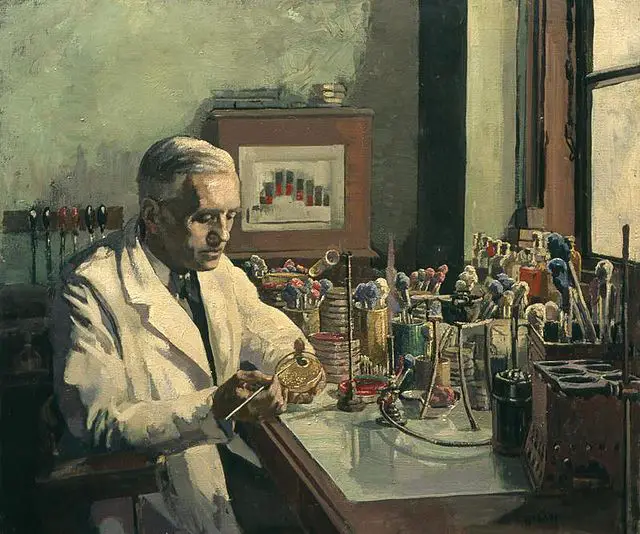He left for vacation. When he came back, everything was different.
In 1928, a Scottish bacteriologist named Alexander Fleming went on holiday and forgot to clean up before he left. If you’ve ever left a moldy sandwich in your backpack, you might relate. But when Fleming came back to his messy lab in London, he noticed something odd. One of his Petri dishes, left out by accident, had grown mold. And not just any mold, a peculiar blue-green fuzz that was doing something extraordinary. It was killing the bacteria around it.
This isn’t a metaphor. It actually happened. And it ended up saving millions of lives.
Not a neat freak, but thank God for that
Fleming wasn’t known for his lab hygiene. His workspace was famously chaotic, full of half-finished experiments and stray samples. To his credit, though, he was sharp enough to notice when something weird was happening. That mold, it turned out, was Penicillium notatum. The juice it secreted killed bacteria without harming human cells.
This was the first antibiotic. Penicillin. And it would change everything.
Wait, so people were just dying from scrapes before this?
Basically, yes. Before penicillin, even minor wounds could become infected and spiral into deadly septicemia. Soldiers in World War I often died not from bullets, but from infections in otherwise survivable injuries. There were no reliable cures. Doctors did what they could with antiseptics, but bacterial infections were like a lottery, and not one you wanted to win.
Fleming’s discovery flipped that script. Suddenly, the idea of curing bacterial infections became real. Not with guesswork. Not with prayer. But with something that actually worked.
It wasn’t instant fame. At first, no one really cared.
You might think the discovery of penicillin would make Fleming a rockstar scientist overnight. But… not quite. His 1929 paper on the mold’s antibacterial properties barely made a splash. The real game-changer came years later, when a team at Oxford, Howard Florey, Ernst Boris Chain, and Norman Heatley, figured out how to purify penicillin and produce it in large quantities.
Fleming planted the seed. But it took a scientific village to turn it into medicine.
War sped everything up
The outbreak of World War II gave penicillin its big break. The Allies knew that if they could mass-produce the stuff, it could save thousands of lives. So the U.S. government got involved. Pharmaceutical companies were enlisted. By D-Day in 1944, penicillin was stocked in abundance, treating everything from infected wounds to pneumonia.
It was so valuable, soldiers would reportedly pee into containers so the penicillin could be extracted and reused. Not glamorous, but effective.
The “oops” heard round the world
What makes this story stick isn’t just the scientific impact. It’s the very human messiness of it. A forgotten Petri dish. A moldy surprise. A curious scientist who didn’t throw away what looked like garbage. It’s a reminder that breakthroughs don’t always arrive in fireworks. Sometimes they tiptoe in while you’re on vacation.
Also, if you’ve ever felt like a mess, maybe you’re just on the verge of something brilliant.
The Power of Curiosity and Chaos
One of the most beautiful things about Fleming’s discovery is that it wasn’t planned. It didn’t happen in a moment of genius staring at a chalkboard. It happened in a moment of curiosity in a messy lab, in the kind of setting most would dismiss as unprofessional or careless.
It reminds us that science isn’t always clean. Sometimes, it’s about noticing what others overlook. About paying attention when the world gives you a nudge.
Fleming didn’t create penicillin. Nature did. But he saw what it could mean.
Fleming’s legacy: more than mold
Alexander Fleming eventually received a Nobel Prize, along with Florey and Chain. But he also became a symbol of how science actually happens, through observation, persistence, and a healthy dose of accident.
He warned people, too. Overusing antibiotics, he said, could lead to resistant bacteria. And guess what? He was right about that, too. We’re living in that prediction now.
Still, his accidental discovery remains one of the greatest medical breakthroughs of all time. And it all started because he didn’t tidy up before going on holiday.
So maybe… don’t clean your desk today. Just in case.
Sources:
1. Smithsonian Magazine: The Accidental Discovery of Penicillin
2. BBC: Alexander Fleming
3. Nobel Prize Bio: Alexander Fleming

